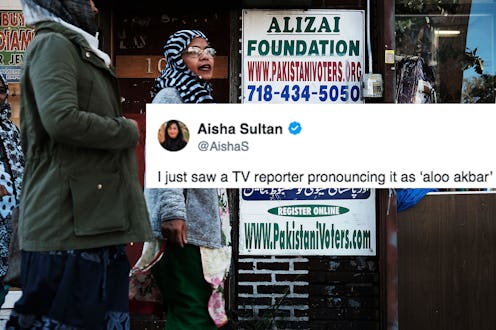
On Tuesday afternoon, authorities reported that a truck driver had allegedly purposefully crashed his vehicle into a bicycle lane in Lower Manhattan. Officials stated that eight people were killed while over a dozen were injured in the incident. Some witnesses claimed they saw the suspect yell "Allahu akbar," so naturally the religious phrase from Islam is making airwaves. And there seems to be some confusion as one tweet shows how people are getting "Allahu akbar" wrong.
Aisha Sultan, a columnist for the St. Louis Post-Dispatch, tweeted, "I just saw a TV reporter pronouncing it as 'aloo akbar' which literally translates to 'potatoes are the greatest.'" Sultan was retweeting Rabia Chaudry's tweet, which said, "For the record, "Allahu Akbar" has no inherent political [or] violent connotation meriting instant terror diagnosis. I say it like 20 times a day."
Both Sultan and Chaudry's tweets deserve elaboration. For starters, Sultan has a point. A lot of people actually don't know how to pronounce "Allahu akbar." So, here's a short little primer on pronunciation, along with other important details. "Allahu akbar" is based in the Arabic language and contains two words making up the phrase that means "Allah is great." It's pronounced like this: Alaw-hu-ak-bur.
Phonetics is super interesting. A slight variation in a person's inflection or over-emphasis on a particular syllable can change the actual meaning of a word. Sultan's tweet of the reporter apparently saying "aloo akbar" becomes entirely different because of the pronunciation. In fact, the language ends up changing. "Aloo" is Urdu for potatoes and so, when someone says "aloo akbar," it literally becomes "potatoes [are] great." And it's true. Potatoes are amazing.
Chaudry's tweet is also important for social reasons. In the West, "Allahu akbar" is commonly confused for only being a battle cry but in reality, millions and millions of Muslims say this phrase in a variety of situations. From extraordinary contexts like when someone gets cured of a debilitating disease to everyday and ordinary situations like praying or even getting up from bed, there is no fixed situation for which "Allahu akbar" must be uttered.
Practicing Muslims say "Allahu akbar" during the five daily prayers every single day. It's that common. And that's why Chaudry's tweet becomes important. In the wake of the Tuesday terror attack in New York City, there's going to be a ton of discussion on the phrase, its meaning, and how in some cases it has definitely been used by terrorists. But the resounding majority of Muslims use "Allahu akbar" for innocuous matters and things that are utterly harmless.
Social vilification of such a common phrase among Muslims is dangerous because it gives a distorted portrayal of a religious minority's practices. It depicts an ordinary phrase in exaggerated and negative light, only leading to more animus against a community that has already been witnessing Islamophobia for years now.
If Sultan and Chaudry's tweets are read together, they make an interesting and combined point. Firstly, it's always good to learn more about the origin of a word or phrase, how it's pronounced, when it's used, and what its general significance is in culture. Secondly, it's critical to remember that words and phrases are appropriated by people all the time. That's how language works.
A phrase can be used in both good and bad contexts, and remembering to take a nuanced stance on that as opposed to panic and paranoia will help people learn more about a community and bridge divisions.